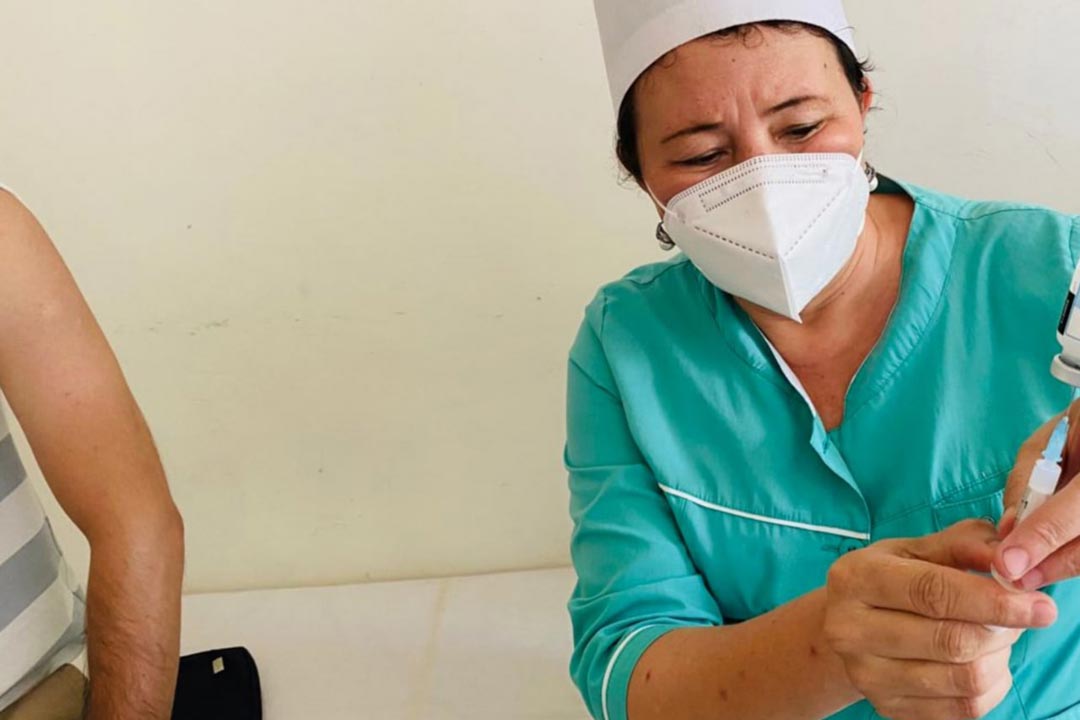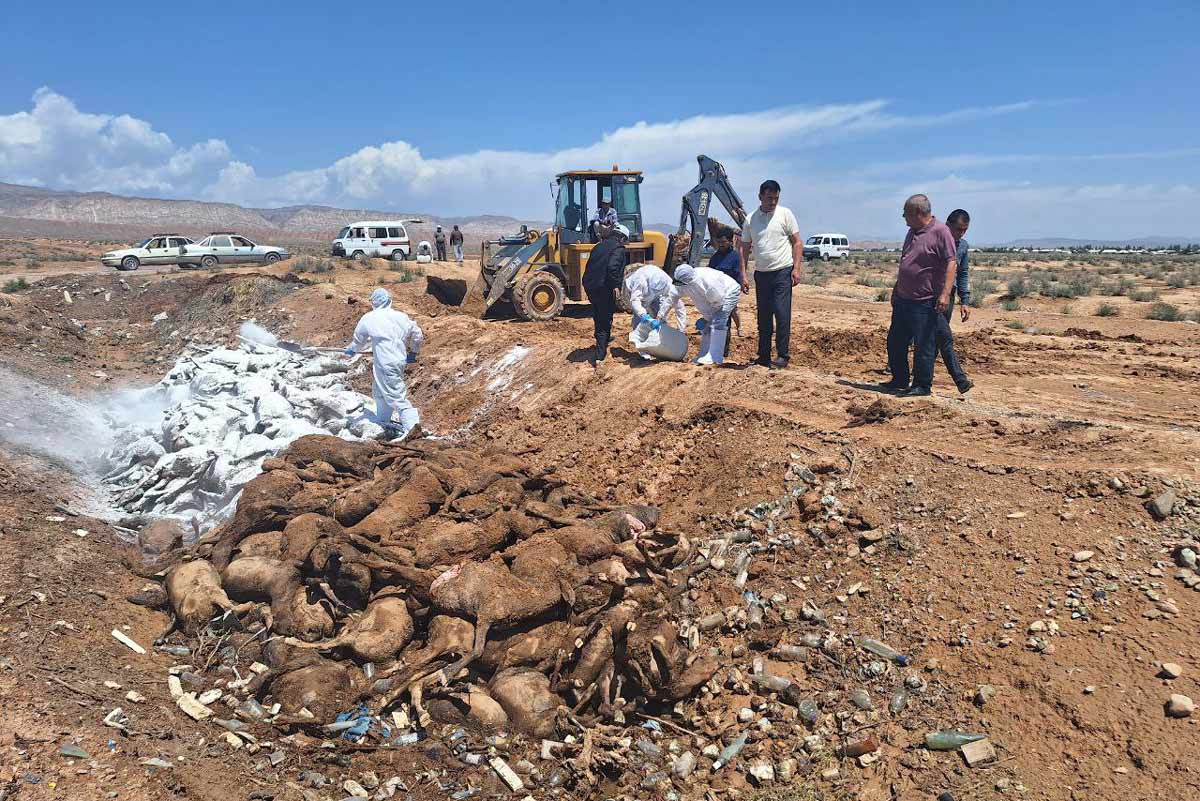Uzbekistan's battle against hepatitis
Uzbekistan plans to eliminate viral hepatitis within the next eight years. Here’s how they plan to do it.
- 21 December 2022
- 6 min read
- by Umida Maniyazova

In the summer of 2022, patients with hepatitis B and C in Uzbekistan breathed a sigh of relief as the country's president signed a long-awaited document on measures to counter the spread of the viral infections.
According to the new law, the prevention of chronic viral liver diseases in the country has been strengthened and, in addition, patients diagnosed with viral hepatitis C now receive free medication.
"In order to prevent transmission of hepatitis B infection, vaccine prophylaxis has been started for persons at high risk of infection, including medical workers who work with blood and its components. It is planned that during 2022-2023 about 120,000 health workers will be fully vaccinated against hepatitis B virus infection."
According to virologist and National Public Health Officer of the World Health Organization Dildora Seckler, "Hypothetically, circa 2.5 million people in our country are infected with viral hepatitis B. Plus, about 1.3 million people are infected with hepatitis C. Almost a third of these people could die of cirrhosis and/or liver cancer."
According to Dr Seckler, screening, hepatitis B vaccination and treatment for hepatitis C (no vaccine yet) will ultimately help prevent the severe consequences of these diseases and deaths.

Credit: D. Seckler
Vaccination
In line with the above-mentioned presidential decree, as of 1 June vaccination of employees working directly with blood in public healthcare institutions against hepatitis B is free of charge.
Since 1 July, private medical institutions have been obliged to vaccinate their employees against hepatitis B at their own expense and to enter information about it into the unified register of chronic viral liver diseases. Previously, no such register existed in the country.
From 1 January 2024, hepatitis B vaccination of employees working with blood and blood components in non-state medical organisations and maintenance of the register will become a mandatory requirement and a condition for licensing medical activities.
Screening and treatment
Also, according to the decree, the annual number of screenings for viral hepatitis B and C types in Uzbekistan is to reach one million while the number of polymerase chain reaction (PCR) tests is set at 15,000 per year. Furthermore, up to 10,500 patients with viral hepatitis C will be treated and drugs will be provided free of charge to patients diagnosed with viral hepatitis C at screening.
Tashkent resident Karina Kim recounts how, this summer, she went to the doctor with a suspicion of Varicella-Zoster virus. The doctor sent her for the hepatitis test and she was found to have hepatitis C antibodies.
"I was given medication for three months at the research institute of virology. I have already started taking them," says Karina. She does not hide her surprise, because she thought that hepatitis C should have manifested itself somehow, but she did not even know it was there.
According to the Uzbek Health Ministry, screening examinations and treatment for hepatitis B are already being conducted in all regions of the country for early detection of the disease.
According to the head of the department of the Research Institute of Virology in Tashkent, Dr Allabergan Bojzhonov, a total of 90,000 modern diagnostic kits for early detection of liver fibrosis and hepatocellular cancer have been installed at the Institute as well as 14 hepatology centres across the country. Also, 46,000 test kits for the quantitative determination of viral antigen in patients diagnosed with hepatitis B have been delivered.
"In order to prevent transmission of hepatitis B infection, vaccine prophylaxis has been started for persons at high risk of infection, including medical workers who work with blood and its components. It is planned that during 2022-2023 about 120,000 health workers will be fully vaccinated against hepatitis B virus infection," says Dr Bojzhonov.
In addition, he says that the screening process is continuing at family polyclinics. A total of 250,000 citizens of the republic have been screened so far (as of December 2022). Screening examinations are completely free of charge.
"By 2030, the goal is to reach a screening rate of 90%. Priorities such as reducing the number of new cases by 90% and mortality by 65% have been set. Hepatitis B vaccination is also compulsory for non-governmental health care providers. From 1 July 2022, non-government healthcare organisations have been obligated to vaccinate their employees who work with blood and blood components against hepatitis B infection," Dr Bojzhonov adds.
Such comprehensive examinations, the doctor says, have not been carried out in Uzbekistan before. Thanks to such testing, the possibility of early diagnosis of viral diseases among the population increases.
Have you read?
"By 1 January, 2023, all medical and preventive institutions, sanitary and epidemiological surveillance and health services regardless of form of ownership (including non-state medical facilities) will create a single electronic register for chronic viral hepatitis B and C," explains Dr Bojzhonov.
"Since 2021, vaccination of new-borns against the hepatitis B virus has been included in the National Vaccination Calendar, and no cases of hepatitis B infection have been registered among those vaccinated. This demonstrates the high level of effectiveness of vaccination."
These measures will ensure that infected people will be constantly monitored, receive timely treatment, and various severe complications of viral hepatitis will be prevented. In addition, the exact number of people with hepatitis will be known.
"Since 2021, vaccination of newborns against the hepatitis B virus has been included in the National Vaccination Calendar, and no cases of hepatitis B infection have been registered among those vaccinated. This demonstrates the high level of effectiveness of vaccination," the doctor adds.
Dildora Seckler says that several years ago specialists from the Tashkent Research Institute, together with scientists from Nagoya University (Japan), conducted large-scale scientific research to determine the effectiveness of hepatitis B vaccination among children.
"And then we scientifically proved that the effectiveness of the vaccine is very high. Whereas in the group of children who did not receive the hepatitis B vaccine, the rate of hepatitis B spread was 9%, among children who received the vaccine the rate was less than 1%. That is a 10-fold reduction in hepatitis B infection with the introduction of the vaccination programme. This is why it is very important that everyone should be universally vaccinated against hepatitis B. Then we will be able to defeat this infection," says the virologist.
Mokhigul Nazirova, a nurse at a family health clinic in the country, says she received a free hepatitis B vaccine in November.
"I used to wear gloves when I was carrying out procedures on citizens, but I can't say I was very afraid of catching something. You are more afraid that the patient will feel unwell during the procedure and you do not think about the rest. Since getting the vaccine, I have become calmer, if only because I have four children, and I might unknowingly contract viral hepatitis at work and infect a family member," says Mokhigul.
As Seckler points out, vaccination of health care workers who deal directly with blood is very important, but it is just as important to follow biosafety rules.
"I would recommend not relaxing because no vaccine gives a 100% guarantee against infection. In order to keep yourself safe, you need to follow all safety precautions. Being vaccinated does not mean one can work with blood without gloves. This would be a false sense of security. One should apply all preventive measures like wearing gloves and overalls when in contact with blood and other body fluids," notes the virologist.









